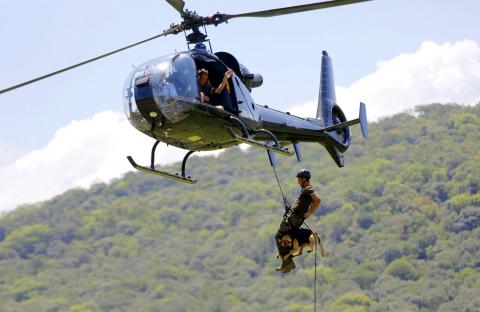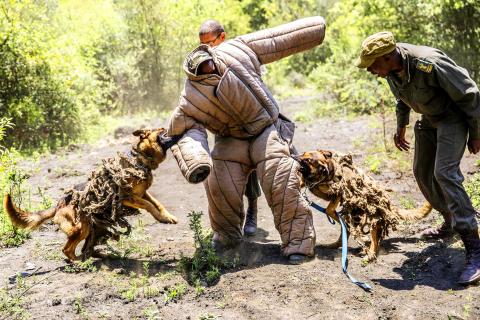Strapped into a black nylon harness, Venom abseils down 30m from a helicopter to a bush clearing. The two-year-old Belgian shepherd’s master Marius slides down in tandem and unclips the dog. Then it races across the grass and tears down a man wearing a felt-stuffed bite suit.
Venom is one of an army of dogs being trained as part of South African defense company Paramount Group’s contribution to fighting poachers in the nation, home to most of the world’s rhinoceroses. Prized for their horns, which are used in Asian traditional medicine, a record 1,020 rhinoceroses have been slaughtered this year, triple the number recorded three years ago.
The Belgian Malinois, as the breed is also known, “can work in extreme conditions,” said Henry Holsthyzen, who runs Paramount’s K9 Solutions dog academy, at a presentation of the year-old school on Thursday. “It’s been proven useful in Iraq and Afghanistan. It’s high-energy, highly intelligent and very fast. It’s an awesome package.”

Photo: EPA
Rhinoceros horns are made of the same material as human hair or fingernails, yet are more valuable than gold by weight. Prices per kilogram range between US$65,000 and US$95,000 in China and Vietnam, where consumers buy them in a powdered form to ingest as a supposed cure for cancer and to try to improve their libido.
South Africa is trying a number of measures to end poaching, including setting up a protection zone within Kruger National Park, moving rhinoceroses to private ranches and deploying soldiers to fight poachers.
Johannesburg-based Paramount, run by the Ichikowitz family, last year contributed a helicopter to help catch poachers in Kruger.

Photo: AFP
The K9 academy is about two hours’ drive from Johannesburg, beside the Magaliesburg ridge that stretches out to the west of the city. About 60 adult dogs, some Malinois, some bred with German shepherds, which are bigger and slower, and 60 puppies are preparing for deployment in South Africa’s war on poaching.
Venom’s snout is long and black. The rest of the 30kg dog is covered in a short fawn coat. He pants to keep cool in the more than 30?C heat. A Malinois can sell for as much as 100,000 rands (US$9,093). From the age of about six weeks, the dogs start being trained in the arts of hunting, tracking and detecting.
“With all of the technology in the world, one of the most successful solutions is one of the simplest; man and dog,” foundation director Eric Ichikowitz said.
With a few sharp commands in Afrikaans from Marius, it takes Venom seconds to sniff out a small capsule of rhinoceros horn shavings tucked into the wheel arch of a black Toyota Prado sports utility vehicle (SUV). Marius rewards him by throwing a tennis ball that the dog chases down. Then he sniffs out a rifle in another SUV.
“For the dog, this is a game,” Holsthyzen said. “He does not know how important his contribution is. His reward is play.”
In another training exercise, Marius and Venom leap out of a helicopter into a muddy lake to apprehend a fleeing suspect.
Holsthyzen, a dog trainer for more than 20 years, has arms that are criss-crossed with scars from training sessions with attack dogs.
He deployed the first dog he trained for anti-poaching activities, named Ngwenya, in the Kruger Park in 2010. Weeks later it tracked down poachers who had sawed off a rhinoceros’ horn in the dead of night.
Using the right breed is imperative. When Holsthyzen tried using Blueticks, a hunting dog first bred in Louisiana, the US, he found that the dogs were so fast while tracking that their handlers could not keep up. The foundation is now exploring whether they can fit them with signal-emitting collars and track them with drones.
National parks in South Africa and other countries send their rangers to be trained alongside the dogs, before they return to their reserves as a unit.
It costs the Ichikowitz foundation about 130,000 rands to groom one dog for action and then about 50,000 rands per year in upkeep. In the bush, they are deployed with mobile ranger units for three days before being airlifted home.
As rangers lie in the dust firing R1 rifles at boards 90m away, the dogs start barking in the distance.
“When the shots are fired, for the dogs it’s time to get aggressive,” Holsthyzen said.

Airlines in Australia, Hong Kong, India, Malaysia and Singapore yesterday canceled flights to and from the Indonesian island of Bali, after a nearby volcano catapulted an ash tower into the sky. Australia’s Jetstar, Qantas and Virgin Australia all grounded flights after Mount Lewotobi Laki-Laki on Flores island spewed a 9km tower a day earlier. Malaysia Airlines, AirAsia, India’s IndiGo and Singapore’s Scoot also listed flights as canceled. “Volcanic ash poses a significant threat to safe operations of the aircraft in the vicinity of volcanic clouds,” AirAsia said as it announced several cancelations. Multiple eruptions from the 1,703m twin-peaked volcano in

A plane bringing Israeli soccer supporters home from Amsterdam landed at Israel’s Ben Gurion airport on Friday after a night of violence that Israeli and Dutch officials condemned as “anti-Semitic.” Dutch police said 62 arrests were made in connection with the violence, which erupted after a UEFA Europa League soccer tie between Amsterdam club Ajax and Maccabi Tel Aviv. Israeli flag carrier El Al said it was sending six planes to the Netherlands to bring the fans home, after the first flight carrying evacuees landed on Friday afternoon, the Israeli Airports Authority said. Israeli Prime Minister Benjamin Netanyahu also ordered

Former US House of Representatives speaker Nancy Pelosi said if US President Joe Biden had ended his re-election bid sooner, the Democratic Party could have held a competitive nominating process to choose his replacement. “Had the president gotten out sooner, there may have been other candidates in the race,” Pelosi said in an interview on Thursday published by the New York Times the next day. “The anticipation was that, if the president were to step aside, that there would be an open primary,” she said. Pelosi said she thought the Democratic candidate, US Vice President Kamala Harris, “would have done

Farmer Liu Bingyong used to make a tidy profit selling milk but is now leaking cash — hit by a dairy sector crisis that embodies several of China’s economic woes. Milk is not a traditional mainstay of Chinese diets, but the Chinese government has long pushed people to drink more, citing its health benefits. The country has expanded its dairy production capacity and imported vast numbers of cattle in recent years as Beijing pursues food self-sufficiency. However, chronically low consumption has left the market sloshing with unwanted milk — driving down prices and pushing farmers to the brink — while